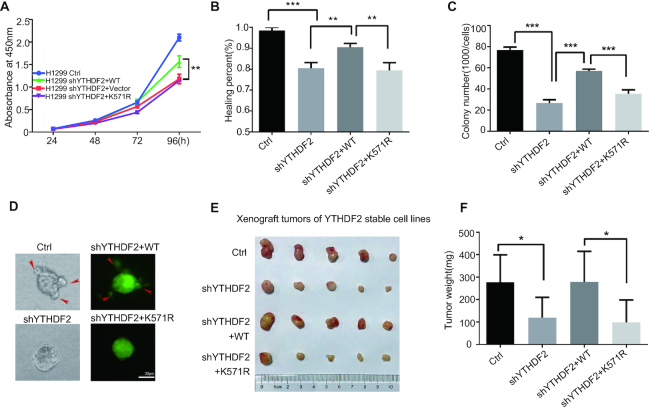Figure 6.
SUMOylation of YTHDF2 promotes cancer progression. (A) Mutation K571R of YTHDF2 inhibits cell proliferation of H1299 cells as determined by CCK8 assays. Stable H1299 cell lines were seeded and then cell proliferation was measured by CCK8 values as indicated time. (B) Mutation K571R of YTHDF2 inhibits cell migration of H1299 cells as verified by wound healing assay. Images were captured at indicated time. The healing percentage was calculated by image J and was presented by histogram. Error bars ±SD represent of three independent experiments. (C) SUMOylation of YTHDF2 promotes soft-agar colony formation. 1000 of each stable H1299 cell line were seeded per well in 2 ml of medium containing 10% FBS with 0.35% soft agarose and layered over a 0.6% solidified agarose. Photographs were taken 21 days after seeding. The number of colonies was calculated. Each value represents as mean±SEM of three independent experiments with triplicates. (D) Mutation K571R of YTHDF2 downregulates the invasive ability of stable H1299 cells by 3D culture growth assay. Photos were taken at 5 days post seeding. The images (left panels) were taken under the white light, and the green signals indicated the expression of GFP in the plasmid pCD513B-Flag-YTHDF2. (E, F) SUMOylation of YTHDF2 promotes xenograft tumor growth in vivo. 3 × 106 of each stable H1299 cell line was injected subcutaneously into male BALB/c nude mice individually. Mice were sacrificed 35 days later, and tumors were dissected (E) and weighted (F, n = 5). Two-tailed Student's t-tests were used for statistical analysis, and differences with P values of <0.05 (*), < 0.01 (**) or < 0.001 (***) were considered significant.

